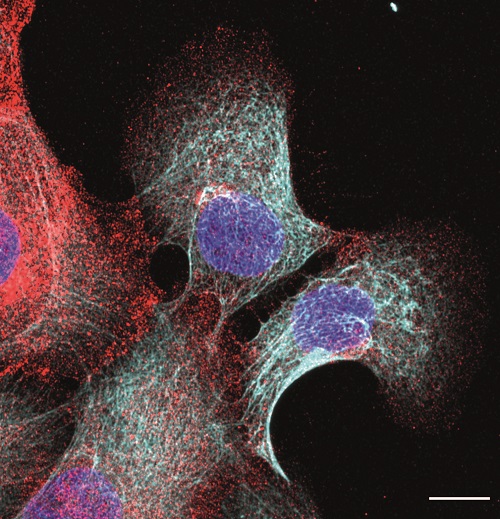The Mechano·Control project aims to understand and control cellular mechanics from molecules to organs, and all the way up to the organism level. With this approach, its interdisciplinary research community will develop specific therapeutic approaches to tackle breast cancer. Zanetta Kechagia joined the Mechano·Control consortium from the first day that the project was launched. She is a postdoc in the team led by Pere Roca-Cusachs at IBEC, who is the principal investigator of the project.
Zanetta is focused on understanding the role of cell mechanics in the cellular and subcellular level. She is particularly interested on how extracellular matrix (ECM) composition and stiffness can jointly influence cell behaviour. “To achieve this, we are using a series of molecular and mechanical perturbations to unravel the role of specific cell-ECM interactions in shaping cellular mechanoresponses” explains Zanetta.

Currently, she and other researchers at Roca-Cusachs’ lab are trying to identify which cell-ECM interactions can alter the mechanical properties of the cell cytoskeleton. To do so, she uses optical tweezers to perform oscillatory rheological studies, probing cytoskeletal mechanoresponses that are specific for different extracellular molecular components.
“We have found that cells respond to stiffness differently on different ECM substrates and that integrin molecules are key mediators of such responses. By using different ECM coatings, we can probe specific integrin interactions and record changes in the viscoelastic properties of the cytoskeleton over time.” – Zanetta Kechagia, PostDoc at IBEC
Mechanical forces greatly influence cell behaviour, for example in determining whether they differentiate, proliferate, or adopt a malignant phenotype. Understanding how molecular interactions can lead to changes in cell mechanical properties is a fundamental step in order to understand how mechanics control cellular behaviour and eventually tissue responses and cancer progression.
To meet this end, Zanetta is performing these experiments using breast epithelial cell lines with the aim to validate them at the organoid and tissue level, with the help of the other consortium partners. The Mechano·control project covers all scales, starting from single molecule nanotechnology at the smallest scale, to organoids and animal models at the organism scale to uncover cell responses to force at every scale.
Mechano·Control brings together very distinct but complementary research fields and scientists of the highest calibre in their respective fields. For Zanetta, joining the Mechano·Control project has been a great experience so far. “I had the chance to participate in several meetings, visit the partner institutions and discuss my work with our colleagues. This helped me to acquire new knowledge and new research ideas to rise. One such exceptional experience was the summer school organised by Mechano·Control in 2019, where all the partners had the chance to exchange research ideas and present their work to an international audience.”



